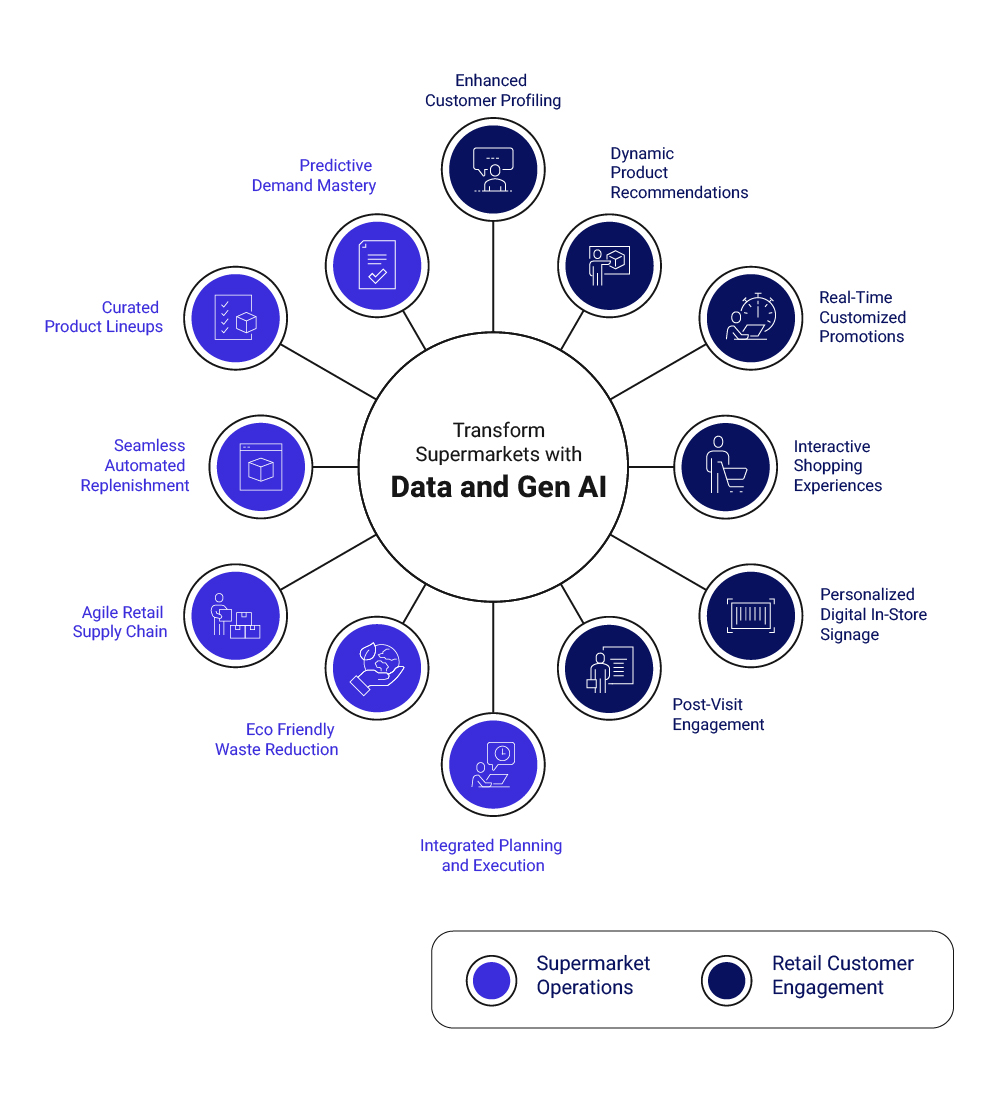In the competitive world of retail, supermarkets are constantly seeking innovative ways to enhance efficiency and customer engagement. With the advent of generative artificial intelligence (Gen AI), these goals are becoming more attainable. By strategically utilizing data and integrating Gen AI technologies, supermarkets are setting new standards for operational efficiency and customer satisfaction.
Here’s a deeper dive into how these technologies are reshaping the retail landscape:
Supercharging Supermarket Operations for Peak Efficiency
The fusion of data analytics and Generative AI is reshaping inventory and supply chain management in supermarket operations. These advanced technologies enable supermarkets to optimize operations more efficiently, reduce waste, and enhance customer satisfaction. Let’s explore in detail the impact of data and Gen AI on transforming inventory and supply chain management in supermarkets.
Predictive Demand Mastery
Accurate demand forecasting is critical for effective inventory management. By leveraging data analytics, supermarkets can analyze historical sales data, current market trends, customer preferences, and seasonal influences to predict future product demands accurately. Gen AI takes this a step further by using machine learning algorithms to continuously learn from data inputs, generate models, and simulate various scenarios, improving its predictions over time. AI-powered inventory management enables supermarkets to adjust inventory levels dynamically, ensuring shelves are stocked appropriately without overstocking.
Curated Product Lineups
Gen AI enhances assortment planning by predicting future trends and customer preferences. AI algorithms can analyze vast datasets to identify emerging patterns and generate recommendations for new product introductions, seasonal items, and discontinuations. Also, Gen AI can enhance inventory management by dynamically adjusting stock based on real-time data. AI algorithms can predict sudden changes in demand due to events, weather changes, or market trends, allowing retailers to fine-tune their inventory proactively.
Seamless Automated Replenishment
Traditional replenishment systems often relied on static rules and manual inputs to manage inventory. Retailers would set predefined thresholds for when to reorder products, which lacked flexibility and adaptability to changing market conditions. Gen AI can automate the replenishment process by determining optimal reorder points for each product, considering lead times and variability in demand. This AI-driven approach efficiently maintains inventory levels by dynamically adjusting replenishment schedules, simultaneously reducing the risk of stockouts and excess inventory. By automating orders, supermarkets can also reduce the administrative burden on staff, allowing them to focus on customer service and other critical operations.
Agile Retail Supply Chain
The retail supply chain traditionally relied on reactive decision- making and rule-based systems. Retailers can now leverage Gen AI to optimize the entire supply chain from procurement to product delivery. It can analyze logistics data to identify the most efficient routes and methods for transportation, thereby minimizing delays and reducing transportation costs. Moreover, AI can manage relationships with multiple suppliers by selecting or recommending suppliers based on their reliability, quality, cost, and delivery performance, ensuring supermarkets maintain a resilient supply chain.
Eco-friendly Waste Reduction
One significant focus area for supermarket inventory management is reducing waste, particularly of perishable goods. By predicting the expiration of products and analyzing purchasing patterns, AI can suggest promotional strategies or alternative sales channels for products likely to spoil. This not only helps in reducing waste but also in reclaiming potential lost revenue.
Integrated Planning and Execution
Most retailers operate on fixed planning cycles, such as monthly or quarterly reviews, which do not allow for real-time adjustments. With GenAI, planning becomes a continuous process rather than confined to fixed cycles. It allows for the synchronization of inventory management with workforce scheduling, marketing campaigns, and store layouts. For example, if AI predicts high demand for certain products, it can prompt changes in store displays or staff schedules to handle increased customer traffic, ensuring a seamless shopping experience.

Amplifying Customer Engagement with Personalized Experiences
Generative AI can analyze extensive datasets to accurately predict customer preferences and behavior, going beyond traditional analytics. Gen AI is revolutionizing the retail industry by enabling supermarkets to offer highly personalized customer interactions. This advanced AI technology goes beyond standard personalization techniques by generating content and solutions in real-time, catering specifically to individual customer needs and behaviors. Here’s a comprehensive overview of how supermarkets can leverage Gen AI to transform customer interactions:
Enhanced Customer Profiling
Retailers used broad customer segments to target their marketing efforts with limited profiling. Leveraging data analytics for retail has become a business imperative today, with Gen AI playing a pivotal role. Generative AI can synthesize vast amounts of data from various sources, including transaction histories, customer feedback, social media activity, and in-store behaviors. It uses deep learning techniques, to create detailed and dynamic customer profiles that update in real-time, providing a nuanced understanding of customer preferences and lifestyle choices. This allows supermarkets to craft highly targeted marketing strategies that resonate deeply with each customer.
Dynamic Product Recommendations
Unlike traditional recommendation systems that suggest products based on similar customer profiles, Gen AI can generate unique recommendations by understanding context, nuances in customer moods, and current market trends. For example, if a customer regularly buys ingredients for Italian cooking, Gen AI can suggest new products or recipes based on the latest trends in Italian cuisine or even create personalized recipes for them.
Real-Time Customized Promotions
Typically, supermarkets plan promotional campaigns in advance and execute them in a fixed manner, with little room for adjustment based on real-time data or customer responses. Gen AI can analyze real-time data streams to offer personalized promotions based not only on a customer’s shopping history but also on variables such as time of day, current location within the store, and even weather conditions. This means that customers can receive offers on hot beverages on cold days or promotions on sunscreens during sunny weekends as they enter the relevant aisles.
Interactive Shopping Experiences
Supermarkets can use Gen AI to power virtual shopping assistants in mobile apps and in-store kiosks, which engage with customers in conversational language. These AI assistants can provide information, guide customers to products, and offer personalized shopping advice based on the customer’s dietary preferences or budget constraints.
Personalized Digital In-Store Signage
Digital signage typically displays the same content to all viewers, regardless of their preferences or behaviors. Gen AI can dynamically change digital signage within the store to reflect promotions, information, or messages customized to the customers currently viewing them. For customers who have the retailer’s app installed on their mobile devices and have enabled in-store identification via beacons, digital displays can adapt dynamically. As different customers walk by, the displays can switch from advertising a kids’ cereal promotion to highlighting gourmet coffee tailored to each customer’s purchase history or demographic data.
Post-Visit Engagement
After the store visit, Gen AI can automate follow-up communications that go beyond standard thank-you emails. It can generate personalized content such as meal plans based on purchases, tips for product usage, or reminders for re-stocking commonly bought items, enhancing customer relationships and encouraging repeat visits.
Conclusion
Integrating strategic data and generative AI in the supermarket sector enhances operational efficiencies and revolutionizes how customers interact with retail brands. As these technologies continue to evolve, they will provide even more opportunities for supermarkets to innovate and thrive in an increasingly digital marketplace. By leveraging these cutting-edge tools, supermarkets can ensure they meet and exceed customer expectations in the digital age.
Are you looking to unlock efficiency and boost customer engagement by leveraging data and generative AI for your retail ecosystem?
Get ahead of the curve with our AI-led, data-driven IT solutions tailored to your unique needs. Curate impactful customer journeys and drive competitive agility and exponential growth. Check out our offerings here.



















